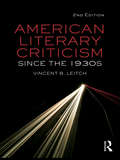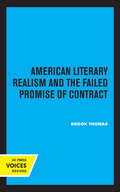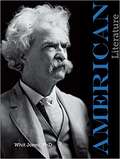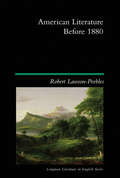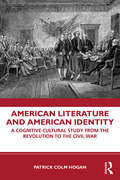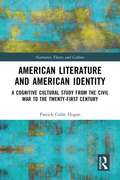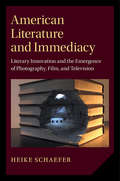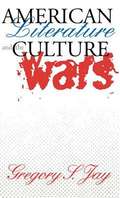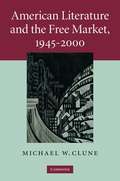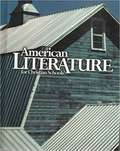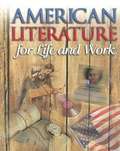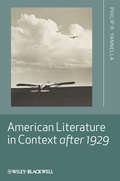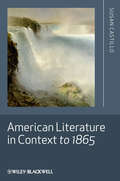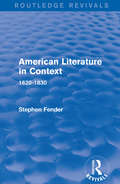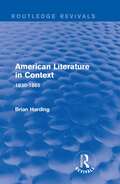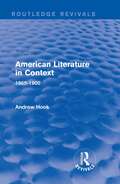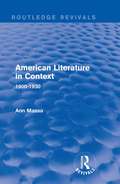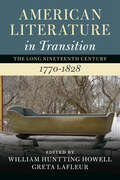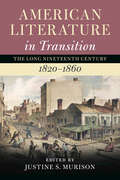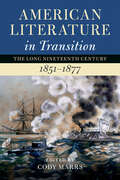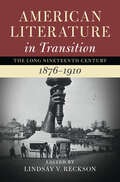- Table View
- List View
American Literary Criticism Since the 1930s
by Vincent B. LeitchAmerican Literary Criticism Since the 1930s fully updates Vincent B. Leitch’s classic book, American Literary Criticism from the 30s to the 80s following the development of the American academy right up to the present day. Updated throughout and with a brand new chapter, this second edition: provides a critical history of American literary theory and practice, discussing the impact of major schools and movements examines the social and cultural background to literary research, considering the role of key theories and practices provides profiles of major figures and influential texts, outlining the connections among theorists presents a new chapter on developments since the 1980s, including discussions of feminist, queer, postcolonial and ethnic criticism. Comprehensive and engaging, this book offers a crucial overview of the development of literary studies in American universities, and a springboard to further research for all those interested in the development and study of Literature.
American Literary Realism and the Failed Promise of Contract
by Brook ThomasThis title is part of UC Press's Voices Revived program, which commemorates University of California Press’s mission to seek out and cultivate the brightest minds and give them voice, reach, and impact. Drawing on a backlist dating to 1893, Voices Revived makes high-quality, peer-reviewed scholarship accessible once again using print-on-demand technology. This title was originally published in `1997.
American Literary Studies
by Michael A. Elliott Claudia StokesAmerican Literary Studies: A Methodological Reader gathers together leading scholars of American literature to address the questions of methodology that have invigorated and divided their field: the rise of interdisciplinarity and the wealth of theoretical methods now available to the critic of American literature. Their engagement with these issues takes a unique form in this book: Each scholar has chosen a methodologically innovative essay, which he or she then introduces, explaining why it is both exemplary in its approach and central to the issues that most engage American literary scholarship today. The book includes both an introduction to the controversial interdisciplinary methods that have made American literary studies such a vibrant field, as well as groundbreaking scholarship on topics as diverse as James Fenimore Cooper, minstrel songs, and Lakota Indian stories. This volume has been designed to serve as a starting point for teachers and students to explore the fundamental questions of American literary scholarship: What does "method" mean in literary studies? Which texts should it study? What makes literary study unique? What should literary scholarship do? American Literary Studies argues that these questions can only be answered through a discussion of the interdisciplinary methods currently in use by scholars today. Finally, an original introduction by Michael A. Elliott and Claudia Stokes explains why questions of method are crucial to American literary studies and how past scholars of American literature have tried to answer them. Contributors include: Lauren Berlant, Russ Castronovo, Wai Chee Dimock, Ann duCille, Michael A. Elliott, Frances Smith Foster, Elaine A. Jahner, Rob Kroes, Arnold Krupat, Paul Lauter, Marilee Lindemann, W. T. Lhamon, Jr., Christopher J. Looby, David Palumbo-Liu, Roy Harvey Pearce, Lora Romero, Ramón Saldívar, Carroll Smith-Rosenberg, Werner Sollors, Claudia Stokes, Claudia Tate, Paula A. Treichler, Priscilla Wald, Michael Warner, Laura Wexler, Sau-ling C. Wong
American Literature
by Molly Harrington DuganThis book is an anthology of American Literature. An anthology is a collection of literature written by different authors. The literature can be poems, plays, short stories, essays, parts of novels, folktales, legends, or myths.
American Literature
by Whit JonesThis American literature homeschool curriculum for high school will teach students to analyze major works of American literature from a biblical perspective. The course is authored by Dr. Whit Jones, a homeschool dad and professor at Bryan College.
American Literature Before 1880 (Longman Literature In English Series)
by Robert Lawson-PeeblesAmerican Literature Before 1880 attempts to place its subject in the broadest possible international perspective. It begins with Homer looking westward, and ends with Henry James crossing the Atlantic eastwards. In between, the book examines the projection of images of the East onto an as-yet unrecognised West; the cultural consequences of Viking, Colombian, and then English migration to America; the growth and independence of the British American colonies; the key writers of the new Republic; and the development of the culture of the United States before and after the Civil War. It is intended both as an introduction for undergraduates to the richness and variety of American Literature, and as a contribution to the debate about its distinctive nature. The book therefore begins with a lengthy survey of earlier histories of American Literature.
American Literature and American Identity: A Cognitive Cultural Study From the Revolution Through the Civil War
by Patrick Colm HoganAmerican Literature and American Identity addresses the crucial issue of identity formation, especially national identity, in influential works of American literature. Patrick Colm Hogan uses techniques of cognitive and affective science to examine the complex and often highly ambivalent treatment of American identity in works by Melville, Cooper, Sedgwick, Apess, Stowe, Jacobs, Douglass, Hawthorne, Poe, and Judith Sargeant Murray. Hogan focuses on the issue of how authors imagined American identity—specifically, as universal, democratic egalitarianism—in the face of the nation’s clear and often brutal inequalities of race and sex. In the course of this study, Hogan advances our understanding of nationalism in general, American identity in particular, and the widely read literary works he examines.
American Literature and American Identity: A Cognitive Cultural Study from the Civil War to the Twenty-First Century (Narrative Theory and Culture)
by Patrick Colm HoganIn recent years, cognitive and affective science have become increasingly important for interpretation and explanation in the social sciences and humanities. However, little of this work has addressed American literature, and virtually none has treated national identity formation in influential works since the Civil War. In this book, Hogan develops his earlier cognitive and affective analyses of national identity, further exploring the ways in which such identity is integrated with cross-culturally recurring patterns in story structure. Hogan examines how authors imagined American identity—understood as universal, democratic egalitarianism—in the face of the nation’s clear and often brutal inequalities of race, sex, and sexuality, exploring the complex and often ambivalent treatment of American identity in works by Charlotte Perkins Gilman, Eugene O’Neill, Lillian Hellman, Djuna Barnes, Amiri Baraka, Margaret Atwood, N. Scott Momaday, Spike Lee, Leslie Marmon Silko, Tony Kushner, and Heidi Schreck.
American Literature and American Identity: A Cognitive Cultural Study from the Civil War to the Twenty-First Century (Narrative Theory and Culture)
by Patrick Colm HoganIn recent years, cognitive and affective science have become increasingly important for interpretation and explanation in the social sciences and humanities. However, little of this work has addressed American literature, and virtually none has treated national identity formation in influential works since the Civil War. In this book, Hogan develops his earlier cognitive and affective analyses of national identity, further exploring the ways in which such identity is integrated with cross-culturally recurring patterns in story structure. Hogan examines how authors imagined American identity—understood as universal, democratic egalitarianism—in the face of the nation’s clear and often brutal inequalities of race, sex, and sexuality, exploring the complex and often ambivalent treatment of American identity in works by Charlotte Perkins Gilman, Eugene O’Neill, Lillian Hellman, Djuna Barnes, Amiri Baraka, Margaret Atwood, N. Scott Momaday, Spike Lee, Leslie Marmon Silko, Tony Kushner, and Heidi Schreck.
American Literature and Immediacy: Literary Innovation and the Emergence of Photography, Film, and Television (Cambridge Studies in American Literature and Culture #184)
by Heike SchaeferThe search for immediacy, the desire to feel directly connected to people or events, has been a driving force in American literature and media culture for the past two centuries. This book offers the first in-depth study of literary immediacy effects. It shows how the heightened reality effects of photography, film, and television inspired American writers to create new literary forms that would enhance their readers' sense of immediate participation in the world. The study combines close readings of Emerson, Whitman, Stein, Dos Passos, Coover, Foster Wallace, and DeLillo with detailed considerations of visual media to open up a new perspective on literary innovation and the ongoing cultural quest for increased immediacy. It argues that we can better understand how American literature develops when we consider experiments with literary form, not only in literary and cultural contexts but also in relation to the emergence of new media, their immediacy effects, and the larger changes in social life that they manifest and provoke.
American Literature and the Culture Wars
by Gregory S. JayIn this book the author states that he will be: "...questioning both the scope and the purpose of American literary studies. What ends do we pursue in the study and teaching of an "American" literature? Has the idea of a canon of great books reached the end of its usefulness? Where does American literature end and Mexican or Caribbean or Canadian or postcolonial literature begin? Is multiculturalism the end of civilization as we know it or the start of an overdue regeneration of our politics and pedagogy? How has the political economy of making ends meet in an era of downsizing and privatization affected academic freedom and the course of academic study? What happens in the classroom when we try to put an end to the conventional ways in which we have conceived and taught our subject? Playing off the pun in the title of this introduction, then, I want to explore this set of questions about the "ends" of American literary studies. This exploration includes rethinking our ends both in the nominal sense of "pragmatic intention" (goal, aim, objective, design, scheme) and in the verbal sense of "reaching a conclusion" (limit, terminate, cease, halt, expire). By focusing attention on these many ends and the controversial issues they involve, I hope in part to explain how this once arcane academic discipline ended up at the center of the culture wars."
American Literature and the Destruction of Knowledge: Innovative Writing in the Age of Epistemology
by Ronald E. MartinIn this challenging work, Ronald E. Martin analyzes the impulse of major nineteenth- and twentieth-century American writers to undermine not only their inherited paradigms of literary and linguistic thought but to question how paradigms themselves are constructed. Through analyses of these writers, as well as contemporaneous scientists, mathematicians, philosophers, and visual artists, American Literature and the Destruction of Knowledge creates a panoramic view of American literature over the past 150 years and shows it to be a crucial part of the great philosophical changes of the period.The works of Melville, Emerson, Whitman, and Dickinson, followed by Crane, Frost, Pound, Stein, Hemingway, Dos Passos, Aiken, Stevens, and Williams, are examined as part of a cultural current that casts doubt on the possibility of knowledge itself. The destruction of concepts, of literary and linguistic forms, was for these writers a precondition for liberating the imagination to gain more access to the self and the real world. As part of the exploration of this cultural context, literary and philosophical realisms are examined together, allowing a comparison of their somewhat different objectives, as well as their common epistemological predicament.
American Literature and the Free Market, 1945–2000
by Michael W. CluneThe years after World War Two have seen a widespread fascination with the free market. Michael W. Clune considers this fascination in postwar literature. In the fictional worlds created by works ranging from Frank O'Hara's poetry to nineties gangster rap, the market is transformed, offering an alternative form of life, distinct from both the social visions of the left and the individualist ethos of the right. These ideas also provide an unsettling example of how art takes on social power by offering an escape from society. American Literature and the Free Market presents a new perspective on a number of wide ranging works for readers of American post-war literature.
American Literature for Christian Schools
by Raymond A. St. John"American Literature for Christian Schools tells the story of the writing done in the United States from its beginnings until the present. It covers key events, major literary movements and principal players of a dynamic heritage that was forn four centuries ago and remains today a vital expression of the heart and soul of the American people."
American Literature for Life and Work
by Christine Bideganeta Larocco Elaine Bowe JohnsonThe four-volume Literature for Life and Work series continues with American Literature for Life and Work(Grade 11). These literature selections challenge students to think critically, work together in teams, and reflect on universal themes in life and work by reading selections from great American literature.
American Literature in Context after 1929
by Philip R. YannellaThis book situates American literature from the Great Depression to the present day in its historical contextExplores the issues that engaged American writers from 1929 to the presentDraws on a range of documents from magazine and newspaper accounts to government reports and important non-fictionThe book covers political ferment of the 1930s; post-World War II anti-Communism; post-War affluence; suburbanization and demographic change; juvenile delinquency, mental illness and the perception of the U.S. as a "sick" society; and post-1965 immigrationDesigned to be compatible with the major anthologies of literature from the periodEquips students and general readers with the necessary historical context needed to understand the writings from this period and provides original and useful readings that demonstrate how context contributes to meaning Includes a historical timeline, featuring key literary works, American presidents, and historical events
American Literature in Context to 1865
by Susan CastilloAmerican Literature in Context to 1865 discusses the issues and events that engaged American writers of the period, providing original and useful readings of important literary works that demonstrate how context contributes to meaningCovers a range of genres including the myths, chants and songs of indigenous cultures, sermons, slave narratives, essays and the novels and poetry to 1865Designed to be used alongside the major anthologies of literature from the periodEquips students with the necessary historical context needed to understand the writings from this periodPedagogical features include a detailed bibliography, and a transatlantic timeline, with literary works, and historical events
American Literature in Context: 1620-1830 (Routledge Revivals: American Literature in Context)
by Stephen FenderFirst published between 1982 and 1983, this series examines the peculiarly American cultural context out of which the nation’s literature has developed. Covering the years from 1620 to 1830, this first volume of American Literature in Context examines a range of texts from the writings of the Puritan settlers through the declaration of Independence to the novels of Fenimore Cooper. In doing so, it shows how early Americans thought about their growing nation, their arguments for immigration, for political and cultural independence, and the doubts they experienced in this ambitious project. This book will be of interest to those studying American literature and American studies.
American Literature in Context: 1830-1865 (Routledge Revivals: American Literature in Context)
by Brian HardingFirst published between 1982 and 1983, this series examines the peculiarly American cultural context out of which the nation’s literature has developed. Covering the years from 1830 to 1865, this second volume of American Literature in Context examines twelve major American writers of the three decades before the Civil War, including Edgar Allan Poe, Ralph Waldo Emerson, Henry David Thoreau, Herman Melville and Walt Whitman. The book also analyses the writing of two contemporary historians, an intellectual Journalist and Abraham Lincoln. Among the major themes discussed the religious heritage of New England Transcendentalism, sectional rivalries, tensions between self-culture and social awareness, and the widening gulf between the idea of national destiny and the fact of growing disunity. In addition, the dominant literary forms of the period – sermon, essay, travelogue – are related to the common cultural assumptions of the age. This book will be of interest to those studying American literature and American studies.
American Literature in Context: 1865-1900 (Routledge Revivals: American Literature in Context)
by Andrew HookFirst published between 1982 and 1983, this series examines the peculiarly American cultural context out of which the nation’s literature has developed. Covering the years from 1865 to 1900, this third volume of American Literature in Context focuses on the struggles of American writers to make sense of their rapidly changing world. In addition to such major figures as Walt Whitman, Henry James, Emily Dickinson and Mark Twain, it analyses the writings of an unorthodox economist (Henry George), a Utopian reformer (Edward Bellamy) and a critical sociologist (Thorstein Veblen). Particular attention is paid to the challenge to conventional literary and cultural values represented by writers such as William Dean Howell who pursued a new form of scientific, democratic realism in American writing. This book will be of interest to those studying American literature and American studies.
American Literature in Context: 1900-1930 (Routledge Revivals: American Literature in Context)
by Ann MassaFirst published between 1982 and 1983, this series examines the peculiarly American cultural context out of which the nation’s literature has developed. Covering the years from 1900 to 1930, this fourth volume of American Literature in Context focuses on how American literature dealt with the challenges of the period including the First World War and the stock market crash. It examines key writers of the time such as Henry James, Gertrude Stein, Ezra Pound, F Scott Fitzgerald and Eugene O’Neill who, unlike many Americans who sought escape, confronted reality, providing a rich and varied literature that reflects these turbulent years. This book will be of interest to those studying American literature and American studies.
American Literature in Transition, 1770–1828 (Nineteenth-Century American Literature in Transition)
by William Huntting Howell Greta LaFleur<p>This volume presents a complex portrait of the United States of America grappling with the trials of national adolescence. Topics include (but are not limited to): the dynamics of language and power, the treachery of memory, the lived experience of racial and economic inequality, the aesthetics of Indigeneity, the radical possibilities of disability, the fluidity of gender and sexuality, the depth and culture-making power of literary genre, the history of poetics, the cult of performance, and the hidden costs of foodways. Taken together, the essays offer a vision of a vibrant, contradictory, and conflicted early US Republic resistant to consensus accountings and poised to inform new and better origin stories for the polity to come.</p>
American Literature in Transition, 1820–1860: Volume 2 (Nineteenth-Century American Literature in Transition)
by Justine S. MurisonThe essays in American Literature in Transition, 1820-1860 offer a new approach to the antebellum era, one that frames the age not merely as the precursor to the Civil War but as indispensable for understanding present crises around such issues as race, imperialism, climate change, and the role of literature in American society. The essays make visible and usable the period's fecund imagined futures, futures that certainly included disunion but not only disunion. Tracing the historical contexts, literary forms and formats, global coordinates, and present reverberations of antebellum literature and culture, the essays in this volume build on existing scholarship while indicating exciting new avenues for research and teaching. Taken together, the essays in this volume make this era's literature relevant for a new generation of students and scholars.
American Literature in Transition, 1851–1877 (American Literature in Transition: The Long Nineteenth Century)
by Cody MarrsBetween 1851 and 1877, the U.S. underwent a whirlwind of change. This volume offers a fresh account of this important era, assessing the many developments - both major and minor - that transformed American literature. In a wide range of chapters, scholars re-examine literary history before, during, and after the Civil War, revealing significant changes not only in how literature is written but also in how it is conceived, distributed, and consumed. Cutting across literary periods that are typically considered separate and distinct, and incorporating an array of methods and approaches, this volume discloses the Long Civil War to be an era of ongoing struggle and cultural contestation. It thus captures the dynamism of this period in American literary history as well as its ever-evolving field of study.
American Literature in Transition, 1876–1910: Volume 4 (Nineteenth-Century American Literature in Transition #Volume 4)
by Lindsay V. Reckson<p>Addressing US literature from 1876 to 1910, this volume aims to account for the period's immense transformations while troubling the ideology of progress that underwrote much of its self-understanding. This volume queries the various forms and formations of post-Reconstruction American literature. It contends that the literature of this period, most often referred to as 'turn-of-the-century' might be more productively oriented by the end of Reconstruction and the haunting aftermath of its emancipatory potential than by the logic of temporal and social advance that underwrote the end of the century and the beginning of the Progressive Era. Acknowledging that nearly all US literature after 1876 might be described as post-Reconstruction, the volume invites readers to reframe this period by asking: under what terms did post-Reconstruction American literature challenge or re-consolidate the 'nation' as an affective, political, and discursive phenomenon? And what kind of alternative pasts and futures did it write into existence?</p>
